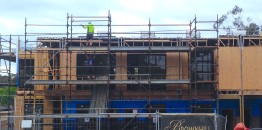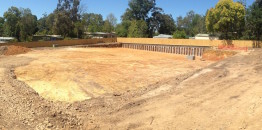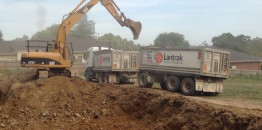 Buying property off the plan means entering into a contract with a developer to buy a property before the completion of construction. Since there is no physical property to inspect or see, you view the design, building plans and pictures to get an idea about what the property will look like on completion.
Buying property off the plan means entering into a contract with a developer to buy a property before the completion of construction. Since there is no physical property to inspect or see, you view the design, building plans and pictures to get an idea about what the property will look like on completion.
The contract of sale for any property should spell out what you are getting for your money. It is prudent to get your legal adviser to take a look over it before you sign it.
Usually the sales contract requires you to pay an initial 10 percent deposit of the purchase amount, which is held in a trust account. Then on completion of the construction, you must pay the balance and take possession of your new property.
An off the plan contract is drafted slightly differently from a standard property contract for obvious reasons – there is no physical property to exchange yet.
What is covered in an off the plan contract
It is important to check that the following things have been included in the contract:
▪ Adequate plan disclosure
In an off the plan contract, a developer is required to include plans, specifications, and timeline of what they plan to construct as the final product. It is important to review these plans so that you are satisfied with the level of disclosure and the standard of the finishes.
▪ Cooling off period
In most Australian states, a cooling off period of two to three days applies to an off the plan contract, which means you are free to alter your purchase decision during this time. Try to find out if there is any termination penalty if you decide to withdraw during this time. Remember, you are legally bound to buy the property when the period ends.
▪ Finance
Before buying off the plan in a new property development make sure you are fully aware of your financial position. If you are planning on borrowing money from a lender to buy your property make sure you check with them about how they treat off the plan sales. Most lenders have different policies and ways of dealing with off the plan sales. Check with your lender if you can get approval for financing before the completion of the project.
▪ Stamp duty
As a buyer, you must pay stamp duty on your property within the required time period. Check if you are eligible for any concessions or exemptions available to those who buy residential property. You may need to get some legal advice on how much you may need to pay or what discounts you could be eligible for. Further information about stamp duty discounts in Victoria can be found on the State Revenue Office website.
▪ Inclusions and warranties
Inclusions are basically all the things that will be included in your property when it is finished. You don’t want to buy a property off the plan and then find out it doesn’t include doors or windows! An inclusion list will cover all the things that will be built into your home or as part of the development. Common things are the type of doors, floors, benchtops, cupboards, paint colour, door handles, oven and much more. Make sure you are clear about what you are paying for and what you will get. You also need to confirm what warranties you might be covered by. In Victoria, a newly built home comes with a three month period where defects will be corrected. This might be doors that stick, windows that don’t close properly or other things that pop up after you move in. The house will also be covered by a builder’s warranty, so if there are serious structural problems you can get them fixed.
▪ Completion
The contract should identify the estimated time when the property should be completed. Make sure you understand what happens if there is a delay or if the project gets cancelled. If the project gets cancelled you should get your deposit refunded. The developer is usually able to cancel the contract if the plan of subdivision can not be registered within a specified period of time, commonly between 18 months and 3 years from the day of sale.
You should also be aware the timeframe for settlement once the property is ready for you to move in. Usually it is 14 days after completion.
When buying off the plan, it is important to closely review the contract details to make sure you understand exactly what you are signing up for, and also that you get what you pay for when the property is built.







{ 0 comments… add one }